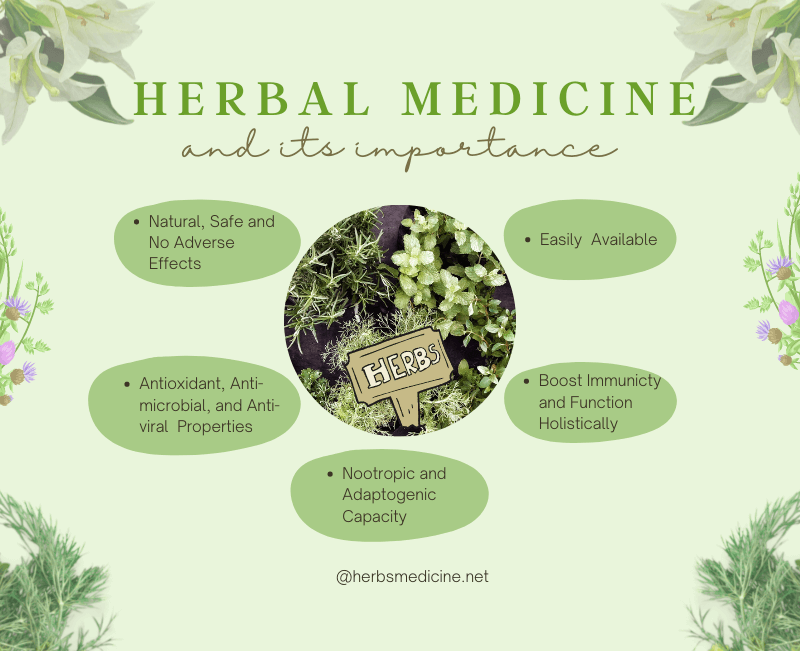In this blog post, we will be exploring herbal medicine and its importance. Herbal medicine has been used for centuries to treat various illnesses and conditions. Some people believe that herbal medicine is more effective than traditional medication.
In contrast, others think it can be used in conjunction with conventional therapies to improve the effectiveness of treatment. Let’s dig into this matter in detail. Stay tuned!
What Is Herbal Medicine, and How Does It Work?
Herbal medicine is a form of alternative medicine that uses plant-based ingredients to treat various conditions. At its core, herbal medicine works by harnessing the unique properties of plants and herbs to support the body’s natural healing processes. Depending on the ingredients used and how they are prepared, herbal remedies can be effective for everything from fighting off colds and flu to easing chronic pain or digestive disorders. Moreover, because these remedies are derived from nature rather than being synthesized in a lab, many favor herbal treatments for their perceived lack of side effects or chemical residues. Whether you’re looking for an alternative treatment for a chronic condition or just interested in exploring the benefits of natural remedies, herbal medicine may be worth considering.
The Benefits of Using Herbal Medicine
There are many compelling reasons to consider using herbal medicine as part of one’s healthcare regimen.
For starters, herbal medicine is natural and typically gentler on the body than conventional medications. It also allows people to take a more active role in their care by giving them greater control over the therapeutic process.
Additionally, many herbal treatments can help address many conditions without the risk of adverse side effects. And perhaps most importantly, herbal medicines often possess unique health-promoting qualities that can help to boost immunity and stave off illness.
More importantly, herbal medicine has antioxidant, antimicrobial, anti-viral, nootropic, and adaptogenic properties.
On top of that, it functions for health holistically addressing the root causes of diseases.
Now if you’re looking for an alternative treatment option or want to feel better overall, using herbal medicine is sure to provide a range of tangible benefits. So why not give it a try?
How to Use Herbal Medicine for Common Ailments
When it comes to treating common ailments, there is no one-size-fits-all solution. As every person is unique, what works for one person may not work for another. That being said, many herbal remedies can be used to help treat a wide range of conditions.
For respiratory problems like coughs and the common cold, for example, echinacea and mullein are both effective botanicals that can be taken in tea form or applied topically as a poultice or salve.
For viral infections like the flu, elderberry and garlic extracts have been shown to boost the immune system and prevent the onset of symptoms. And for aches and pains such as sore muscles and arthritis flare-ups, painkilling herbs like peppermint, eucalyptus, ginger, clove, and turmeric can provide immediate relief without the adverse side effects often associated with prescription drugs and over-the-counter medications.
Whether you want to use natural remedies for minor ailments or prefer more intensive herbal treatments for more severe conditions, using herbal medicine as part of your overall health strategy can help you achieve greater well-being safely and sustainably.
Herbal Remedies for Chronic Conditions
For many men suffering from chronic conditions like erectile dysfunction, herbal remedies have become a popular and effective treatment option. These natural compounds are typically made from plant extracts or other natural substances. They have been shown to help address the underlying causes of various health issues, including ED. In addition to their beneficial effects on blood pressure and cholesterol levels, herbal remedies can also boost libido and improve overall sexual performance, making them ideal for tackling the symptoms of ED in men of all ages.
The Risks Associated with Herbal Medicine
The most commonly reported issue is erectile dysfunction, which can have severe consequences for both men and their partners. Furthermore, herbal remedies often interact with other medications, so it is essential to consult with a healthcare professional before beginning any new course of treatment. Other potential dangers include allergic reactions, severe side effects, and even toxicity in some instances. Overall, it is crucial to be aware of the potential risks associated with herbal medicine to make informed decisions about your health and well-being.
Side Effects of Herbs and How to Avoid Them
When it comes to herbs, there are many benefits to be had. These natural plants are often rich in antioxidants and other beneficial compounds that can help to support a variety of health functions. However, while herbs can be an essential part of a healthy lifestyle, they come with their potential side effects. This can include adverse effects such as gastrointestinal upset or dizziness when taken in large amounts. To avoid experiencing these side effects, it is essential to consult with a medical professional before beginning a regimen that includes herbs. They can help you make informed choices based on your individual health needs and any other factors that may impact how you respond to the herb in question. So if you’re considering adding herbs to your routine, it’s always best to start on the right foot by seeking professional advice first!
Takeaway
We may conclude that the significance of herbal medicine is beyond description and its importance lies in the fact that most of the raw materials of allopathic medicines come from herbs. Herbalism is the safest way of treatment for various diseases.
But in using herbal medicine you should consult your physician. Because herbal medicine may not always be fit for your health condition.
Thank you for reading! And stay with Herbs and Herbal Remedies to know more about herbalism!!!
References
1. Sissi Wachtel-Galor, & Iris. (2017). Herbal Medicine. Nih.gov; CRC Press/Taylor & Francis. https://www.ncbi.nlm.nih.gov/books/NBK92773/
2. https://campuspress.yale.edu/ledger/what-are-the-benefits-of-herbal-medicine/
3. https://wthn.com/blogs/wthnside-out/the-benefits-of-herbal-medicine-power-of-plants

